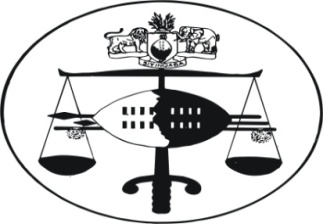- Case summary
- Criminal law – Extenuating factors in the form of low education and youth taken into consideration in reducing accused’s moral blameworthiness – factors taken into account in sentencing – sentenced to Twenty (20) years imprisonment for the murder and One (1) year imprisonment with an option of a fine of E1000.00 with respect to the theft. The sentences are backdated to the accused’s date of arrest.

IN THE HIGH COURT OF ESWATINI
JUDGMENT
Case No. 421/16
In the matter between:
THE KING
AND
NTOKOZO KENNETH SIMELANE
Neutral citation: The King vs Ntokozo Kenneth Simelane [421/16] [2020] SZHC 112 (23rd June, 2020)
Coram: FAKUDZE, J
Heard: 16th June, 2020
Delivered: 23rd June, 2020
Summary: Criminal law – Extenuating factors in the form of low education and youth taken into consideration in reducing accused’s moral blameworthiness – factors taken into account in sentencing – sentenced to Twenty (20) years imprisonment for the murder and One (1) year imprisonment with an option of a fine of E1000.00 with respect to the theft. The sentences are backdated to the accused’s date of arrest.
JUDGMENT ON EXTENUATION AND SENTENCE
[1] The accused was charged with the offence of murder and theft and the court accordingly found him guilty as charged.
[2] The court is now called upon to determine the issue of extenuation and sentence.
EXTENUATION
[3] In S.V. Letsolo 1970 (3) SA 476 A.D. at 476 F-H Holmes defined extenuating circumstances as follows:
“Extenuating circumstances have more than once been defined by this court as any fact bearing on the commission of the crime which reduces the moral blame worthiness of the accused, as distinct from his legal culpability. In this regard the trial court has to consider:
(a) Whether there are facts which might be relevant to extenuation such as immaturity, intoxication or provocation (the list is not exhaustive);
(b) Whether such facts in their cumulative effect, probably had a bearing on the accused’s state of mind in doing what he did;
(c) Whether such bearing has sufficiently appreciable to abate the moral blameworthiness of the accused in doing what he did.
In deciding (c) the trial court exercises a moral judgment. If the answer is yes, it expresses its opinion that there are extenuating circumstances.”
[4] In the Botswana Court of Appeal case of Fly v The State (CLCLB – 099 – 08 [2012} BWLA at paragraph 35, Dr. Twum J.A added a further factor which may be considered as extenuating. The Learned Judge said:
“Low education coupled with a rustic background may do.”
[5] The usual practice in this jurisdiction is to conduct an inquiry on the existence or otherwise of extenuating circumstances immediately after conviction but before mitigation. See Rex v Sibusiso Kunene and Another 25/14 [2014] SZHC 348 (September 2014).
[6] In Daniel Dlamini v Rex Criminal Appeal No. 11/98 it was stated that the onus to prove the existence of extenuating circumstances no longer rests the with accused; its rests with the court and its officers – counsel to enquire as to the presence or absence of extenuating circumstances.
[7] Turning to the case at hand the Crown and the Defence agree that at the time the accused committed the offence, he was twenty three (23) years of age. Youthfulness is one of the factors taken into account as an extenuating factor. There is further agreement that the accused was a teenager and therefore immaturity caused him to commit the offence. The other factor is the lack of education on the part of the accused. In Fly v State (Supra) if has stated that “low education coupled with a rustic background will do.” The court is inclined to agree with the Crown and the Defence that youthfulness, immaturity and low level of education should be considered as extenuating circumstances. This court pronounces this opinion as required by Section 295(1) of the Criminal Procedure and Evidence Act, 1938. I now proceed to deal with the question of sentence.
SENTENCE
[8] The accused was convicted of the crime of murder and theft of a revolver on the 24th October, 2019. In arriving at the appropriate sentence, this court will take into account the seriousness of the offence, the interests of society and the personal interests of the accused.
[9] The factors that favour the accused have been well articulated by his counsel and the court has taken them into account in arriving at the appropriate sentence. The accused is a first offender in that he has never been convicted of any offence. At the time of his arrest, he was Twenty Three (23) years of age. He was also not able to finish school because his parents passed away. He then resided at Siphocosini where he was not welcomed by his relatives because his paternity was in dispute. The accused is someone who is not sophisticated and has had a hard past. Since the accused has never been convicted, prospects of him rehabilitating are high. The accused should therefore be sentenced to between 15 and 25 years as suggested in Madeyi Paris Dludlu v Rex Supreme Court, Criminal Appeal Case No. 26/2013.
[10] The factors that militate against the accused are that the accused has been convicted of a serious offence and that the murder was pre-meditated. The accused is also unremorseful and the offence for which the accused was convicted of is now prevalent. A harsh sentence should therefore be imposed.
[11] Interests that favours society are that the accused committed a very serious offence. He shot and killed an innocent citizen without provocation and under unexplainable circumstances. Killing a person in such an irresponsible manner should serve as a lesson not only to the accused but to also other to be offenders.
[13] In imposing a sentence, this court should take into account the sentencing trends by our courts in similar matters as well as the circumstances of the matter at hand. Based on the above mentioned considerations, I am of the view that a sentence that fits the accused in light of the seriousness of the crime of murder and the interests of society is that of Twenty (20) years imprisonment without an option of a fine. As far as the theft of the gun is concerned, the accused is sentenced to one year imprisonment with an option of a fine of One Thousand Emalangeni (E1000.00). Both sentences are backdated to the date of accused’s arrest.

6